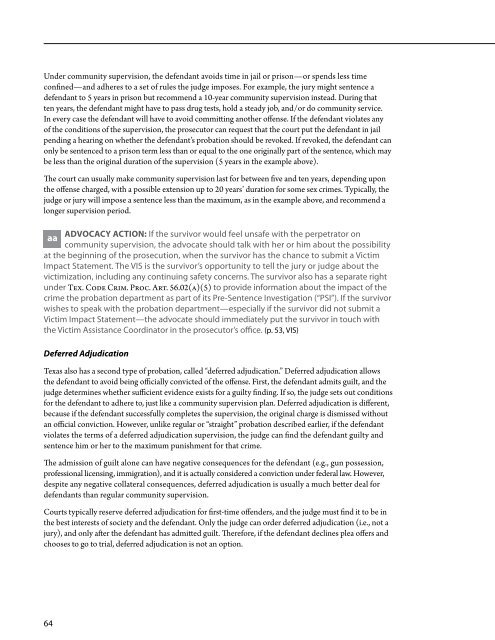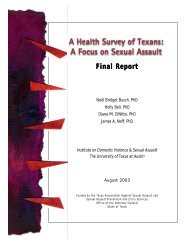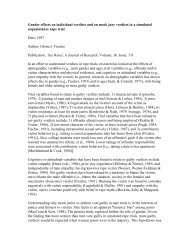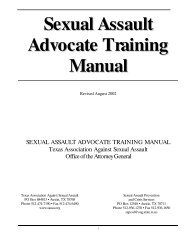Sexual aSSault LEGAL ADVOCACY MANUAL - Texas Association ...
Sexual aSSault LEGAL ADVOCACY MANUAL - Texas Association ...
Sexual aSSault LEGAL ADVOCACY MANUAL - Texas Association ...
You also want an ePaper? Increase the reach of your titles
YUMPU automatically turns print PDFs into web optimized ePapers that Google loves.
Under community supervision, the defendant avoids time in jail or prison—or spends less time<br />
confined—and adheres to a set of rules the judge imposes. For example, the jury might sentence a<br />
defendant to 5 years in prison but recommend a 10-year community supervision instead. During that<br />
ten years, the defendant might have to pass drug tests, hold a steady job, and/or do community service.<br />
In every case the defendant will have to avoid committing another offense. If the defendant violates any<br />
of the conditions of the supervision, the prosecutor can request that the court put the defendant in jail<br />
pending a hearing on whether the defendant’s probation should be revoked. If revoked, the defendant can<br />
only be sentenced to a prison term less than or equal to the one originally part of the sentence, which may<br />
be less than the original duration of the supervision (5 years in the example above).<br />
The court can usually make community supervision last for between five and ten years, depending upon<br />
the offense charged, with a possible extension up to 20 years’ duration for some sex crimes. Typically, the<br />
judge or jury will impose a sentence less than the maximum, as in the example above, and recommend a<br />
longer supervision period.<br />
<strong>ADVOCACY</strong> ACTION: If the survivor would feel unsafe with the perpetrator on<br />
community supervision, the advocate should talk with her or him about the possibility<br />
at the beginning of the prosecution, when the survivor has the chance to submit a Victim<br />
Impact Statement. The VIS is the survivor’s opportunity to tell the jury or judge about the<br />
victimization, including any continuing safety concerns. The survivor also has a separate right<br />
under Tex. Code Crim. Proc. Art. 56.02(a)(5) to provide information about the impact of the<br />
crime the probation department as part of its Pre-Sentence Investigation (“PSI”). If the survivor<br />
wishes to speak with the probation department—especially if the survivor did not submit a<br />
Victim Impact Statement—the advocate should immediately put the survivor in touch with<br />
the Victim Assistance Coordinator in the prosecutor’s office. (p. 53, VIS)<br />
Deferred Adjudication<br />
<strong>Texas</strong> also has a second type of probation, called “deferred adjudication.” Deferred adjudication allows<br />
the defendant to avoid being officially convicted of the offense. First, the defendant admits guilt, and the<br />
judge determines whether sufficient evidence exists for a guilty finding. If so, the judge sets out conditions<br />
for the defendant to adhere to, just like a community supervision plan. Deferred adjudication is different,<br />
because if the defendant successfully completes the supervision, the original charge is dismissed without<br />
an official conviction. However, unlike regular or “straight” probation described earlier, if the defendant<br />
violates the terms of a deferred adjudication supervision, the judge can find the defendant guilty and<br />
sentence him or her to the maximum punishment for that crime.<br />
The admission of guilt alone can have negative consequences for the defendant (e.g., gun possession,<br />
professional licensing, immigration), and it is actually considered a conviction under federal law. However,<br />
despite any negative collateral consequences, deferred adjudication is usually a much better deal for<br />
defendants than regular community supervision.<br />
Courts typically reserve deferred adjudication for first-time offenders, and the judge must find it to be in<br />
the best interests of society and the defendant. Only the judge can order deferred adjudication (i.e., not a<br />
jury), and only after the defendant has admitted guilt. Therefore, if the defendant declines plea offers and<br />
chooses to go to trial, deferred adjudication is not an option.<br />
64
















